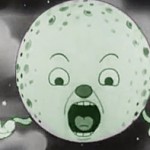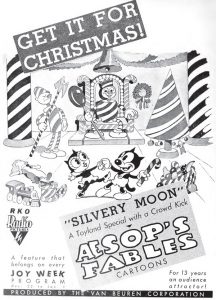


 With the new president in the White House, people were starting to get optimistic about things. Congress was also working fast, and within 2 months of inauguration, the new President was signing a bill legalizing beer of no more than 3.2 percent alcohol – still enough to put a heavy drinker under the table. The Dow Jones Industrial Average had bottomed out in the summer of 1932. There were still millions of unemployed, but people were expecting times to get better. At the movies, the musical had returned to popular favor, and RKO was riding the sound waves with musicals such as those mentioned last time, and Diplomaniacs with Wheeler and Woolsey. Deluge also provided spectacle, and at the end of the year, a head-to-head confrontation between a Broadway dancer and an RKO contract player would become legend, in Flying Down to Rio. Even the cartoons seemed to be improving, not looking quite as primitive as the early ones.
With the new president in the White House, people were starting to get optimistic about things. Congress was also working fast, and within 2 months of inauguration, the new President was signing a bill legalizing beer of no more than 3.2 percent alcohol – still enough to put a heavy drinker under the table. The Dow Jones Industrial Average had bottomed out in the summer of 1932. There were still millions of unemployed, but people were expecting times to get better. At the movies, the musical had returned to popular favor, and RKO was riding the sound waves with musicals such as those mentioned last time, and Diplomaniacs with Wheeler and Woolsey. Deluge also provided spectacle, and at the end of the year, a head-to-head confrontation between a Broadway dancer and an RKO contract player would become legend, in Flying Down to Rio. Even the cartoons seemed to be improving, not looking quite as primitive as the early ones.
Apologies are first in order, as I will have to cover a title which I believed was unavailable, Pickaninny Blues, next time, as a print of same has finally turned up. A surprisingly good cartoon, and not nearly as politically incorrect as its title suggests.
A Yarn of Wool (12/16/32) – A cartoon rhapsody for feline shepherd, a flock of sheep, and a wolf interested in the flock not for meat, but for wool. Needless to say, the sheep are saved, and the wolf gets his come-uppins. Songs: “Rhythm”, written by Ted Dale, copyrighted in 1932, but recorded in 1933, by Ted Lewis for Columbia, and the Erwing Brothers (a West Coast band who recorded only a few sides) on gold box Vocalion. “I Must Have That Man”, another Fields-McHugh song from the score of Blackbirds of 1928, with recordings by Duke Ellington on Victor and also on Columbia (the latter only issued in England), The Knickerbockers on Columbia with Vaughn De Leath on vocal, and vocal records by Adelaide Hall from the original cast on Brunswick, Lee Morse on Columbia, Jack Hylton’s Band on HMV, and Lillie Delk Christian on Okeh Race Records with Louis Armstrong and Jimmie Noone backing her. Later recordings included Teddy Wilson on Brunswick with vocal by Billie Holiday, and Ella Fitzgerald on Verve. “Soldier on the Shelf”, a British novelty from 1930, was recorded by Jack Hylton on HMV (issued here on Victor), Debroy Sommers’ band on British Columbia, Marius B. Winter on Broadcast Twelve, Jay Wilbur on Imperial, Ben Selvin for U.S. Columbia, and Sam Lanin for Perfect, Banner, et al.
Tight Rope Tricks (1/6/33) – Tom and Jerry at the circus. They lead the circus band on parade, and then various of the other human and animal acts, including a lion that is easily angered when T&J eat his steak. One of the voices of Betty Boop turns up again, singing a popular song of the day with special lyrics. Eventually, the lion roars out the traditional circus cry of distress, “Hey Rube”, and all the circus lions run wild, panicking everybody. Tom and Jerry flood the lions away with the help of an overwatered elephant. Songs: “Circus Day” apparently an original for the parade. “You’ll Get By (With a Twinkle In Your Eye)”, written by Roy Turk and J. Fred Coots, recorded by Waring’s Pennsylvanians on Victor, Hal Kemp on Brunswick, and Bob Causer and his Cornellians (a Victor Young house band) with Dick Robertson vocal, on Melotone, Perfect, et al.
Silvery Moon (1/13/33) – Boy ad girl characters (apparently cats) question what the moon is made of. The boy thinks it’s made of green cheese. The girl thinks cakes and ice cream. The moon itself intervenes to settle the discussion, producing a stairway into its mouth. They find a fairyland of sweets. (This subject might have greatly benefitted from being made in color, but such luxuries were not yet available to the studio). The boy and girl cat overindulge, and get pursued off the lunar world by a large bottle of castor oil. They fall back into the lake and their canoe, and bid a farewell to the moon as he pulls a curtain down in front of his face. Songs: a new original song, “Good Night Mr. Moon”, not to be confused with “Goodnight, Moon”, a different 1931 copyright. Also, an extended reuse with retraced animation of “The Siamese Patrol” (embed below, the familiar them starts at 1:19), lifted from Toy Time.
A.M. to P.M. (1/20/33) – A day in the life of a royal sentinel (a sort of dress-rehearsal for Van Bueren’s acquisition of rights to the O. Soglow comic strip “The Little King”, as if produced either to prove they could handle the stylized look of the strip, or as a knock-off to capitalize upon the strip without paying royalties). Practically no plot, as the sentinel engages in random meetings and interactions with eccentric characters. Songs: “Crazy People”, a 1932 pop recorded by Gene Kardos on Victor, Ben Selvin on Columbia, and a Victor Young housse band on Perfect, Melotone, et al. Later revived by Somethin’ Smith and the Redheads for an album on Epic.
Tumble Down Town (1/27/33) – Contrasts between two parts of town: a happy shanty town where everyone is satisfied with what they’ve got, and a part of town predominated by a gas house and occupied by tough yeggs. A boy and girl cat are strolling along in the shanty town, oblivious to what’s going on near the gas works. A confrontation takes place between the leader of the gas house gang and the boy, leading to a veritable riot, and the ejection of the bullies by the shanty town folks. Songs: “A Shanty on Old Shanty Town” and “The Bowery”, both of which we’ve discussed before, and finally, “Down by the Gas House”, a 1926 novelty song with lyrics in tough-guy mode, recorded by Billy Murray and Aileen Stanley for Victor.
Magic Mummy (2/7/33) – Tom and Jerry on the police force, assigned to Radio Car #44, equipped with one of those 1920’s-era radio loudspeakers. A mummy case has been stolen from the museum by a sinister robed figure, and for a while, the cartoon looks like it’s going to be another Svengali story, with the maestro ordering the mummy once unwrapped to sing. (No, she does not perform “Ben Bolt”.) Jerry retrieves the mummy case after a long and convoluted chase, and brings it back to headquarters, only to find that all that is insude the case is Tom. Songs: “The Cop On the Beat, The Man In The Moon, and Me”, a 1932 song with lyrics by Johnny Mercer, recorded by Victor Arden and Phil Ohman and their orchestra on Victor, and on a radio transcription by Phil Harris and his Orchestra. Also, “Sing (It’s Good For You)”, recorded by the Dorsey Brothers for Brunswick, and by Gene Kardos for Victor. It was revived in the stereo era for RCA Victor as the title song for an album by the Norman Luboff Choir.
Love’s Labor Won (3/10/33) – Lots of musical cavorting and barely any plot, with new star Cubby Bear on a date with his girlfriend. A wolf horns in, using a Rube Goldberg style contraption to sharpen his false teeth, but they do little good in confrontation with Cubby, as Cubby causes the dentures to fall out, then kicks them out of frame. The wolf resorts to bare knuckle fisticuffs, but Cubby prevails, giving a radio microphone the “It was a great fight” speech bit. Songs: a possible original which I’ll call “Just a Little Goofer” or “Never Took a Lesson”, featuring Cubby playing a flute while riding a dachshund, and “It Was So Beautiful”, a 1932 pop song, recorded by George Olson for Victor, and as an overblown vocal by Harry Richman on Columbia.
The Last Mail (3/24/33) – Cubby Bear in the frozen North, mushing his dogs and delivering mail by sled to remote outposts in a blinding snowstorm, caused by Jupiter Pluvius sawing open pillows and tossing out their stuffing. A raccoon becomes mail thief and kidnapper of Cubby’s girl at the same time. Cubby enlists the services of an American Eagle manning a first-aid outpost, to swoop down on the villain and battle him out of a tree hideout, then Cubby and the girl mount the eagle to fly the mail safely through. Songs: “The Devil’s Dream”, a standard fiddle tune, especially in the Northeast, deriving from an Irish hornpipe. Don Richardson recorded a Columbia side of it in 1921. William B. Houchens on Gennett in 1922. O’Leary’s Irish Minstrels for Columbia in 1926. George Wade and his Corn Huskers performed it for Canadian Victor in 1931. Clayton McMichen (often second fiddle from Gid Tanner’s Skillet Likkers) recorded it as part of a medley on Decca in 1939. Spade Cooley on Columbia circa 1947. Cliffie Stone on Capitol as part of a medley. Jerry’s Haymakers on Copley Records out of Boston (a label mainly aimed at Irish audiences). Riley Shepherd and Shorty Long on Hi-Tone in the late 1940’s. Coy McDaniel on MGM. Tommy Jackson on Mercury in the early 1950’s. Fiddlin’ Red Heron on Federal in 1951. The film ends with an extended rendition of “Stars and Stripes Forever”, predicting what would be a forthcoming tradition for episodes of Popeye from the studio’s crosstown rival, Fleischer.
More of 1933, next time.